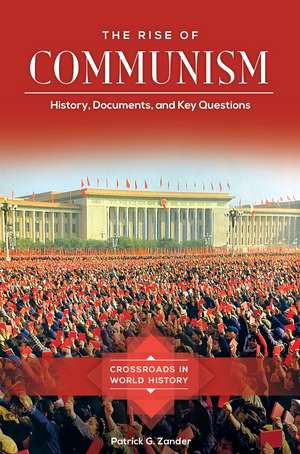The Rise of Communism: History, Documents, and Key Questions: Crossroads in World History
Autor Patrick G. Zanderen Limba Engleză Hardback – 15 feb 2018 – vârsta până la 17 ani
Preț: 271.68 lei
Preț vechi: 520.11 lei
-48% Nou
Puncte Express: 408
Preț estimativ în valută:
51.99€ • 54.17$ • 43.04£
51.99€ • 54.17$ • 43.04£
Carte tipărită la comandă
Livrare economică 03-17 aprilie
Preluare comenzi: 021 569.72.76
Specificații
ISBN-13: 9781440847059
ISBN-10: 1440847053
Pagini: 256
Dimensiuni: 156 x 235 mm
Greutate: 0.59 kg
Editura: Bloomsbury Publishing
Colecția ABC-CLIO
Seria Crossroads in World History
Locul publicării:New York, United States
ISBN-10: 1440847053
Pagini: 256
Dimensiuni: 156 x 235 mm
Greutate: 0.59 kg
Editura: Bloomsbury Publishing
Colecția ABC-CLIO
Seria Crossroads in World History
Locul publicării:New York, United States
Caracteristici
Presents primary source historical documents to give students first-hand accounts of the development of Communist thought and its legacy
Notă biografică
Patrick G. Zander is associate professor of history at Georgia Gwinnett College, where he teaches British and European History. His previous books include ABC-CLIO's The Rise of Fascism: History, Documents, and Key Questions.
Cuprins
Alphabetical List of EntriesTopical List of EntriesHow to Use This BookPrefaceTimelineHistorical OverviewThe Rise of Communism: A to ZPrimary DocumentsKarl Marx and Friedrich Engels, The Communist Manifesto (February 1848)Vladimir Lenin, Imperialism, the Highest Stage of Capitalism (1917)Vladimir Lenin, The "April Theses" (April 1917)The Call for a Popular Front against Fascism: "Resolution of the Seventh World Congress of the Communist International" (August 1935)Joseph Stalin's Response to Churchill's Iron Curtain Speech (March 14, 1946)Mao Zedong Calls for a People's Democratic Dictatorship (June 1949)Kim Il-Sung, Address to the Korean People on the Occasion of the Liberation of Pyong Yang (December 1950)Manifesto of the South Vietnam National Liberation Front (1961)Communication from Nikita Khrushchev to President John F. Kennedy during the Cuban Missile Crisis (October 28, 1962)The Central Committee of the Chinese Communist Party, "The Sixteen Points of the Cultural Revolution" (August 8, 1966)Key QuestionsQuestion 1: Was Communism an Inherently Flawed Theoretical Conception That Would Inevitably Lead to Repressive, Totalitarian States, or Was It a Promising Theory Twisted by Particular Individuals and Institutions Making Communist Regimes Particularly Repressive and Violent?Question 2: Did Communism Provide a Particularly Strong System for the Rapid Advancement of Science and Technology, or Was Such Development Impeded by the Communist System and Inevitably Doomed to Lag Behind the Democratic/Capitalist States?Question 3: Were Cold War Fears about the Communists' Intentions and Means for the Continual Spread of Communism and Eventual World Domination Justified on the Part of the Western Democracies?Selected Annotated BibliographyIndexAbout the Author and Contributors





